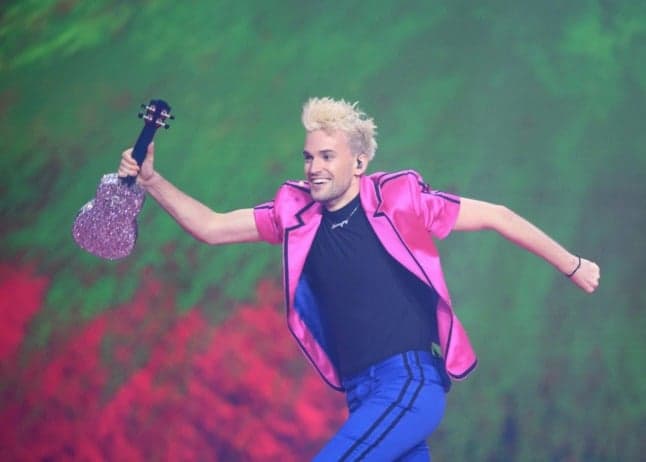Who is the ukulele-playing Hamburger representing Germany in Eurovision 2021?

Jendrik Sigwart represents Germany with his harmonious song “I don’t feel hate” in the 2021 Eurovision Song Contest. Here's what you need to know about him.
Jendrik, a 26-year-old musical performer from Hamburg, has already shaken things up in the Eurovision world.
Known to be energetic, quirky and down-to-earth, Jendrik managed to join the competition - which hosts its finale on Saturday - mainly through perseverance.
The Eurovision Song Contest (ESC) does not usually accept applications, but rather nominations from broadcasters in each country. But by posting self-produced music videos on Instagram and Tik Tok since June 2020, Jendrik hoped to get himself noticed.
READ ALSO: Ten great German Eurovision moments
And he succeeded: he caught the eye of NDR, a German public broadcaster, who granted his wish to be nominated.
“I’m not sure NDR were really expecting me,” he previously said in an interview.
Now, Jendrik is captivating audiences with his colourful performances and his iconic sparkling ukulele.
His song “I don’t feel hate” promotes the idea that we should respond to hatred not with more hate, but with understanding.
The official Eurovision entry for 2021 for Germany.
“I’ve often experienced how, when someone treats me badly, it’s better not to treat them in the same way,” he told the Berliner Morgenpost on Monday.
This extends to his experiences as a gay man in the public eye. As well as real-life run-ins with homophobia, Jendrik has been the target of online abuse because of his sexuality.
Yet he says he won’t let the experiences get to him. “I don’t really care [...], I think it’s a shame when sexuality isn’t accepted in the way it should be.” After all, that’s exactly what his song is about: not letting other people’s negativity affect you.
It’s as much a message to the world as it is a reminder to himself, says Jendrik.
Mario Hanousek, passionate ESC expert, has made positive predictions about Jendrik’s performance in the second semi-final, which takes place on Thursday. He sees younger social-media savvy audiences being especially drawn to him.
For now, Jendrik is simply excited about making it on to the big stage in Rotterdam in the Netherlands. “I AM REALLY GOING TO THE ESC. THIS IS A DREAM COME TRUE! Holla, die Waldfee!” he wrote to NDR when he found out he’d qualified.
“Holla, die Waldfee” is an untranslatable phrase meaning: uncontainable excitement.
Though Germany has participated in Eurovision a total of 64 times, they’ve only ever won twice. The last time was in 2010, when Lena placed first with her song “satellite”.
After a streak of bad luck since then, except for a “top five” victory by Michael Schulte in 2018, there are high hopes that Jendrik could bring in a wind of change.
READ ALSO: Lena wins the Eurovision song contest
Comments
See Also
Jendrik, a 26-year-old musical performer from Hamburg, has already shaken things up in the Eurovision world.
Known to be energetic, quirky and down-to-earth, Jendrik managed to join the competition - which hosts its finale on Saturday - mainly through perseverance.
The Eurovision Song Contest (ESC) does not usually accept applications, but rather nominations from broadcasters in each country. But by posting self-produced music videos on Instagram and Tik Tok since June 2020, Jendrik hoped to get himself noticed.
READ ALSO: Ten great German Eurovision moments
And he succeeded: he caught the eye of NDR, a German public broadcaster, who granted his wish to be nominated.
“I’m not sure NDR were really expecting me,” he previously said in an interview.
Now, Jendrik is captivating audiences with his colourful performances and his iconic sparkling ukulele.
His song “I don’t feel hate” promotes the idea that we should respond to hatred not with more hate, but with understanding.
The official Eurovision entry for 2021 for Germany.
“I’ve often experienced how, when someone treats me badly, it’s better not to treat them in the same way,” he told the Berliner Morgenpost on Monday.
This extends to his experiences as a gay man in the public eye. As well as real-life run-ins with homophobia, Jendrik has been the target of online abuse because of his sexuality.
Yet he says he won’t let the experiences get to him. “I don’t really care [...], I think it’s a shame when sexuality isn’t accepted in the way it should be.” After all, that’s exactly what his song is about: not letting other people’s negativity affect you.
It’s as much a message to the world as it is a reminder to himself, says Jendrik.
Mario Hanousek, passionate ESC expert, has made positive predictions about Jendrik’s performance in the second semi-final, which takes place on Thursday. He sees younger social-media savvy audiences being especially drawn to him.
For now, Jendrik is simply excited about making it on to the big stage in Rotterdam in the Netherlands. “I AM REALLY GOING TO THE ESC. THIS IS A DREAM COME TRUE! Holla, die Waldfee!” he wrote to NDR when he found out he’d qualified.
“Holla, die Waldfee” is an untranslatable phrase meaning: uncontainable excitement.
Though Germany has participated in Eurovision a total of 64 times, they’ve only ever won twice. The last time was in 2010, when Lena placed first with her song “satellite”.
After a streak of bad luck since then, except for a “top five” victory by Michael Schulte in 2018, there are high hopes that Jendrik could bring in a wind of change.
READ ALSO: Lena wins the Eurovision song contest
Join the conversation in our comments section below. Share your own views and experience and if you have a question or suggestion for our journalists then email us at [email protected].
Please keep comments civil, constructive and on topic – and make sure to read our terms of use before getting involved.
Please log in here to leave a comment.